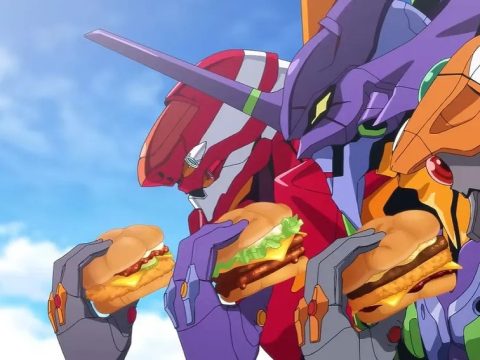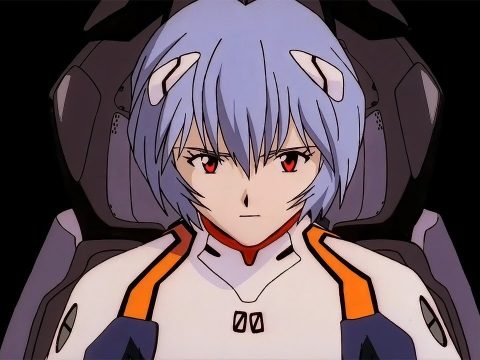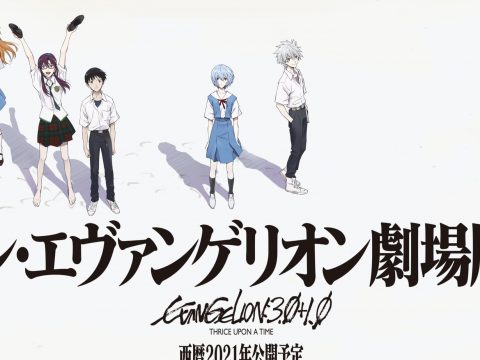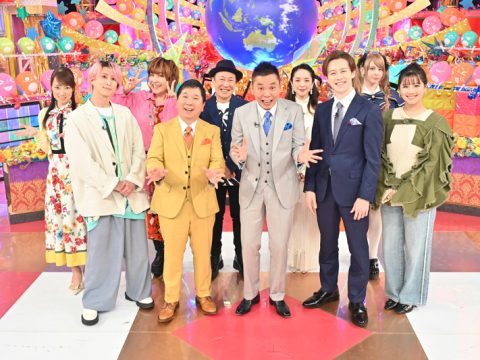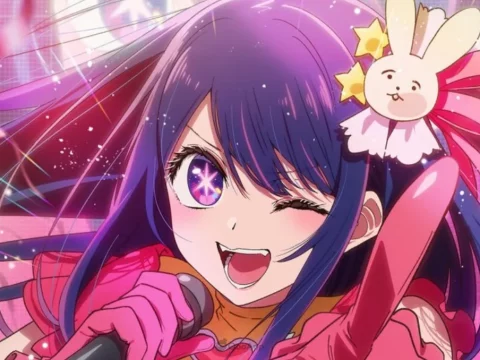I’m really not convinced of the efficacy of the “digest version” movie adaptations of so many popular anime shows. Decades ago, they made sense; 24-hour cable TV wasn’t around, so they were used to fire interest in the stuff on TV (Heidi), fill in gaps in the story (Space Runaway Ideon), provide a much-needed ending that was precluded by the TV show being canned (Baldios), or revitalize an ailing series with toy licensing potential (Gundam).
1996’s Evangelion: Death and Rebirth doesn’t serve any of those purposes. It’s a piecemeal product that is made up of several parts. Its first 70 minutes is Evangelion: Death, a tightly-wound edit of the show’s first 24 episodes. On its face, this isn’t a terrible idea; the movie manages to include all of the best robot fight parts, and even throws in some pretty good new sequences. But since then, these new bits have been folded into the remastered version of the TV series, making the entire affair kind of superfluous to the dedicated fan. One might argue that this flick is a good way to introduce new fans to the series, but it doesn’t serve very well in that respect, simply because so much material is left out.
That still leaves the remaining half-hour of the movie (titled Rebirth), though. That part of the film starts to wrap up the entire story, presenting fans with a mouth-watering new ending (with more explosions, and more on-screen deaths of their favorite heroes), which they’d been demanding since the show’s shockingly subdued, weird original conclusion in March of 1996. This is the good stuff, the stuff worth tuning in for; it’s not groundbreaking, but it’s exciting, bold, and fluid stuff.
This final half-hour of Death and Rebirth eventually got worked into the first half-hour of The End of Evangelion, the grand conclusion to the entire saga that hit Japanese theatres in July of 1997. You know what this means, right? It means that Death and Rebirth, which consists entirely of edited footage from the TV series, new footage that got folded back into subsequent home video releases of the TV series, and the first bit of End of Evangelion, is entirely, 100% superfluous. On its face, it turns out to have been a cash grab, a way to keep interest stoked and money flowing in while director Hideaki Anno and GAINAX labored over the “true” finale of the series. It’s not bad; it’s just not necessary.
It’s even more interesting to reflect on this, however, after sitting down and having a look at Evangelion 1.0: You are (Not) Alone, a recent effort by Anno and his new Studio Khara to breathe some life back into the Evangelion franchise. How do they accomplish this? By re-telling, in digest form, the first third of the TV series.
Ahem. That’s right. The original Evangelion movies represented a do-over of the show’s narrative and initial ending. This means that Evangelion 1.0, the first part of a new Rebuild of Evangelion project, is a do-over of a do-over; a meta-mulligan, if you please.
That isn’t to say that it’s bad stuff. Evangelion 1.0 is very much not bad; it preserves most of what made the show compelling—the frightened, seemingly ineffectual protagonist, the weirdly scary iconic robots, and the permeating religious imagery—and polishes it up with modern digital animation. The action scenes have more verve, the drama has more detail, and we get a better look at teen hearththrob Rei Ayanami’s goodies.
Unfortunately, however, Evangelion 1.0 represents a continuation of what Evangelion: Death and Rebirth represented: the creation of an entertainment product that is, at the end of the day, 100% not required viewing. Evangelion 1.0 is a facelift, but there’s no new insights to be gained here. The new stuff is promised in the forthcoming sequel, which will feature a radically changed Asuka and a new female pilot for fans to slobber over, but it’s just not here. It’s a damn good thing that Anno and his crew have done such a good job with the new animation, because it’s really the film’s facelift that makes it worth seeing.
But Death and Rebirth? Very much not necessary. Looking back at that film gets us back to the whole “what’s the point of digest movies?” discussion. Sure, we have a few that went down as classics, like the original Mobile Suit Gundam trilogy. But most of these films are a waste of time at worst (the Nadia movie) and an agreeable but superfluous diversion at best, like the Gundam SEED recap films. Anyone out there remember how great they were? Didn’t think so.


